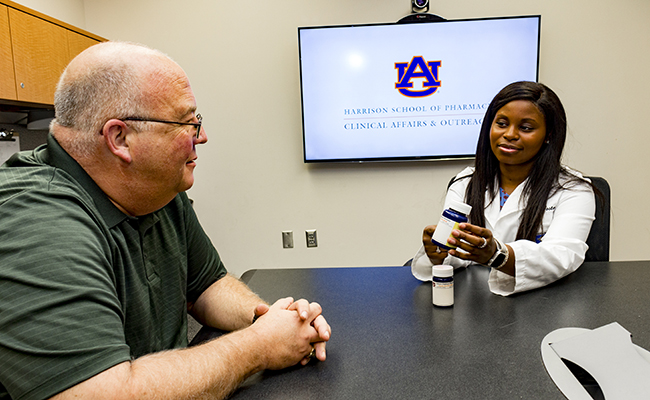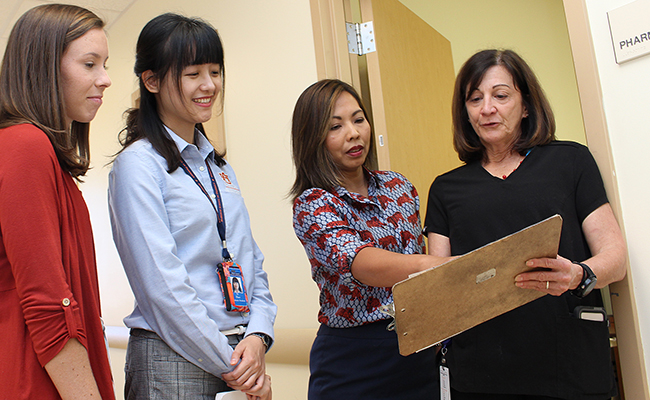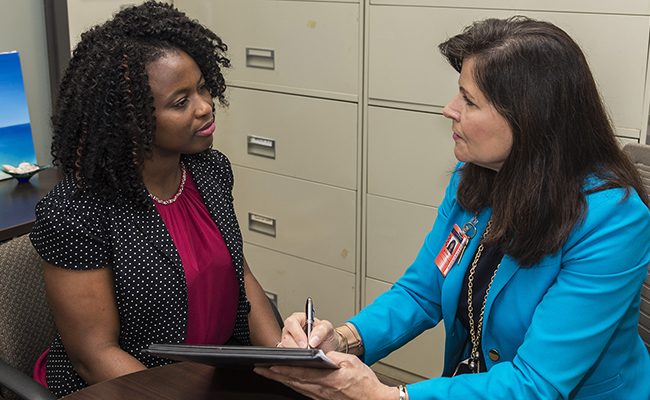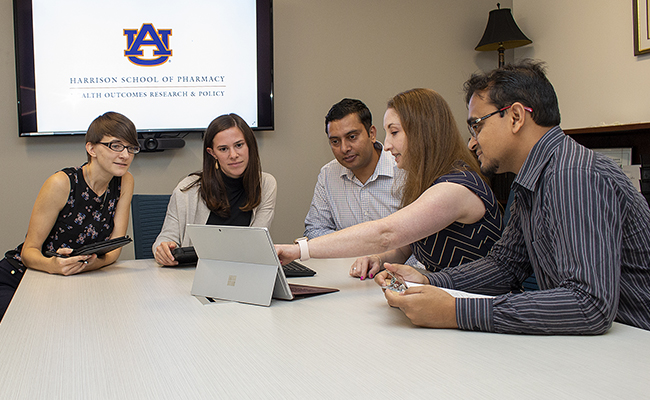
AUBURN, Alabama- As a land-grant institution, Auburn University and the Harrison School of Pharmacy serve the state of Alabama by going above and beyond, ensuring that Alabamians thrive. For Dean Richard Hansen, that commitment to care for Alabama is a vital component of the HSOP mission as the school works with patients and practitioners to improve health outcomes in the state.
An important partner for HSOP in Caring for Alabama is East Alabama Medical Center. Located less than 10 miles from the Auburn University campus, EAMC is a strategic partner in all three of HSOP’s key areas of research, teaching and outreach. The two work together to develop innovative programs that improve the lives of patients and train the next generation of pharmacists.
For Hansen, fostering and growing that relationship with EAMC was near the top of his list after becoming dean.
“EAMC and HSOP have had a long-time partnership but we see an opportunity to strengthen the relationship,” said Hansen. “This includes all aspects of our mission, including teaching, research and outreach. We both have the goal of improving lives in our community and doing that together in a visible and strategic way makes perfect sense.”
A key figure in growing that relationship is Chuck Beams. A member of the HSOP Class of 1997, Beams is currently the Executive Director of Pharmacy and Business Development with EAMC. For him, the idea to grow the relationship further was an obvious one.
“We were in a meeting and Dean Hansen leaned over and asked, ‘do you ever have pharmacy processes or systems that you really need help proving that the changes are actually making a difference?’ I laughed and said, yeah, that happens every day it seems,” said Beams. “It really hit me that there are so many graduate and pharmacy students needing processes to look at, to study and to examine. The possibilities of a win-win situation just blew through my mind. I thought of all the things that we could link arms together and do at EAMC.”
The collaborations between HSOP and EAMC touch on a variety of areas from transitions of care, diabetes education, cardiac rehab outcomes and assistance programs for those with complex cases. Along with those projects, there are two faculty members from the Department of Pharmacy Practice that have staff appointments at EAMC.
“It is really exciting to see the collaboration,” said Beams. “EAMC and Auburn University can work on these types of projects and weave ourselves into one another’s future. We need to be together.”
Through these projects and a budding relationship, HSOP and EAMC are creating innovative programs and life-changing research that directly impacts those in Alabama and enriches the education of HSOP students.
“In educating the next generation of pharmacists, HSOP has a commitment to ensure that our experiential practice sites are leading the way in providing the best quality of care possible,” said Hansen. “Focusing on innovative and high quality practice models in our own backyard at EAMC is a clear way to improve the health of our citizens.”
HSOP and EAMC are partnering on two programs to help patients with difficult or complex situations and are at risk for readmission to the hospital.
One program involves Dr. Jeanna Sewell, assistant clinical professor in the Department of Pharmacy Practice, and her work with Mercy Medical. Patients from EAMC that are uninsured and could benefit from faculty expertise are referred to Dr. Sewell for further assistance.
Additionally, HSOP’s Division of Clinical Affairs and Outreach has taken on a substantial project to work with EAMC and take referrals of Medicaid patients who have complex cases and could benefit from consultation and management by pharmacotherapy experts. Patients are referred to the Clinical Health Services (CHS) unit within the Walker Building if they have chronic medical conditions that are not well controlled.
Conditions that are treated as part of this program are those with chronic medications such as diabetes, hypertension, cardiovascular disease, asthma, chronic obstructive pulmonary disease (COPD), kidney disease and others. While still in the early stages, the program is seeing success on readmission rates.
“After working with CHS pharmacists, one particular patient’s frequency of disease exacerbations requiring hospitalizations was significantly reduced from 10 per year to three per year after CHS began collaborating with EAMC’s healthcare team. This equated to a 70% reduction,” said Dr. Kimberly Braxton Lloyd, HSOP’s associate dean for clinical affairs and outreach.
Pharmacy students have the opportunity to participate in the care of patients who are experiencing changes in their disease control and require close medication monitoring. Students assist with the review of each patient’s medications and identify medication-related problems and/or gaps in care that need to be addressed by the healthcare team. Faculty, students, and interprofessional providers work collaboratively to address these issues and work to optimize the patient’s medications in an authentic clinical learning experience.
“HSOP’s faculty and students are able to work with these patients in order to ensure that the patient’s medications are optimized for maximum efficacy,” said Braxton Lloyd. “We closely monitor the patients after hospital discharge, and are often able to decrease the frequency that these patients are re-admitted to the hospital.”

HSOP students and faculty work with patients referred by EAMC.

Dr. Salisa Westrick (second from right) and her team collaborate with EAMC pharmacist Heidi Strother ’89 (right).
While faculty and students are working directly with patients to curb readmission states, another team is working with EAMC to further study readmission rates and the effect of pharmacist-led transition of care.
Led by Dr. Salisa Westrick, department head in Health Outcomes Research and Policy (HORP), and Dr. Jingjing Qian, associate professor in HORP, the team is interviewing pharmacists and other healthcare personnel who are involved in the transition of care services at EAMC. The retrospective data will then be used to evaluate if patients who received pharmacist-led transition of care services had a lower risk of hospital readmission and/or lower risk of using the emergency room following the discharge within 30 days.
“EAMC is a great model for many local and regional hospitals,” said Westrick. “Findings from this study can be used to promote a transition of care service in similar hospitals across the state.” This study is a true partnership between academic and health care institutions. We both have the same goal which is to improve the health of Alabamians.
EAMC’s innovative services in patient care provide an ideal setting for the research team to conduct its work. Findings from the study can further inform practitioners and policymakers about the effectiveness of this practice model for more broad adoption and implementation.
By comparing those who received pharmacist-led transition of care services against those who did not receive them, the study can help determine how pharmacist-led service at EAMC is affecting readmission rates and further improving health outcomes and financial burden.
“EAMC is a very important local partner for HSOP to enhance our research and teaching in clinical practice,” said Qian. “Strategic collaborations in research, teaching, and outreach benefit both institutions in terms of improving patient outcomes, enhancing quality of healthcare for local communities, and training our next generation of pharmacy practitioners and researchers.”
Dr. Jan Kavookjian, associate professor in Health Outcomes Research and Policy, is one of the leading experts in the country on Motivational Interviewing (MI), a communication skill set that empowers a person to find internal motivation to engage in healthy and positive behaviors. Because of the complicated array of self-management behaviors that comes with diabetes, MI has shown to be a particularly effective way of working with patients to learn and implement those behaviors.
As part of a grant from the Centers for Disease Control and Prevention (CDC) and the National Diabetes Prevention Program (DPP), Kavookjian, a certified DPP Lifestyle Coach, is helping teach some of the DPP curriculum classes to people with pre-diabetes in the region with the DPP program at EAMC’s Diabetes and Nutrition Center (DANC). The purpose of the program is to prevent participants from moving into the diabetes diagnosis range.
A member of the DANC Advisory Board since 2007, Kavookjian is appreciative of the opportunity to work with them and for the support they have provided for her work.
“I have really enjoyed and been privileged to work with EAMC in several ways over the years. I actually did my Ph.D. dissertation study’s formative research there,” said Kavookjian. “EAMC is a very progressive healthcare delivery institution. The process of research here in our own community allows us to not only address our research questions but to also fulfill the important land grant institution objective and responsibility to give of our expertise.”
With MI, the interviews are conducted in a non-judgmental, caring, autonomy-supporting and self-efficacy-supporting way so that the individual ends up making the argument for the change themselves and feels supported and not judged, and therefore feeling no need to get defensive.
“We tend to believe what we hear ourselves say, so a key to MI is to interview the patient in a way that they are talking about the change and its benefits, not in a way that gets them defending the reasons why not to change,” said Kavookjian. “We all want to make our own decisions and don’t like to be told what to do; recognizing this in our communication with patients is an important step towards helping facilitate an individual's decision-making about health behavior change.”

Dr. Jan Kavookjian (right) discusses motivational interviewing techniques for diabetes patients.

Dr. Kimberly Garza (second from right) and her team review data from EAMC.
Dr. Kimberly Garza, associate professor in Health Outcomes Research and Policy, collaborated with Kathe Briggs, director of cardiac rehab and the HealthPlus Fitness Center (a medically-based fitness facility owned by EAMC), to measure outcomes of cardiac rehab and test associations between patient outcomes and delay discounting. Delay discounting is the tendency to prefer smaller immediate rewards over larger rewards for which one must wait.
The duo is still analyzing the data, but the early findings suggest that the association between degree of delay discounting and program outcomes differs across different patient groups. For example, there seems to be an association between degree of delay discounting and capacity for physical activity in women, but no association was found in men.
For those in rehab programs, following the program is crucial and learning and developing ways to get patients to stick to the program is vital to improving health outcomes.
“Learning whether delay discounting predicts outcomes can help inform interventions that help patients stick to their program goals and achieve desirable health outcomes,” said Garza. “This benefits patients directly, and helps the cardiac rehabilitation program demonstrate its effectiveness in patient care.”
For Garza, having a medical center nearby is very beneficial to this kind of research. In order to effectively develop and test interventions and programs, they must first be tested in real patients in real-world scenarios. Demonstrating effectiveness in these real-world settings helps identify the best methods to care for patients, thus improving health-related quality of life and decreasing healthcare costs.
“In addition to enabling access to real patients, collaborations with EAMC also fosters communication between researchers and healthcare professionals to better inform intervention development,” said Garza. “I personally have benefited greatly from talking with cardiac rehab staff about the issues they face with patients on a daily basis and what they perceive to be the biggest barriers to care. This helps me to approach my research with realistic expectations and to develop interventions that are feasible and acceptable to both patients and the healthcare professionals caring for them.”
Further illustrating the collaboration between EAMC and HSOP, one has to look no further than the faculty directory and Drs. Sarah Cogle and Amber Hutchison. Cogle is an assistant clinical professor in the Department of Pharmacy Practice and a critical care/nutrition support clinical pharmacist with EAMC while Hutchison holds the positions of associate clinical professor and clinical pharmacist.
Cogle rounds with an interdisciplinary team that include physicians, nurses, pharmacists, dietitians, physical therapists, respiratory therapists, social workers, palliative care, and students from all disciplines in the medical/surgical ICU. The team provides a collaborative environment where everyone works together to ensure the best possible care is being delivered to patients.
Additionally, she works in nutrition support, which involves providing nutrition in the form of enteral (tube) feedings or parenteral nutrition (PN). PN is a form of nutrition that is delivered intravenously for patients who are unable to consume a regular diet or absorb enough nutrients through tube feeding or by mouth due to illness or a nonfunctioning gastrointestinal tract. As a nutrition support pharmacist, she writes PN orders on a daily basis and works closely with registered dietitians and physicians to ensure each patient’s nutritional needs are being met.
Having faculty members that are active practitioners is key in relating real-world experiences to the classroom.
“I feel our students get a great deal out of observing their faculty members and preceptors provide patient care and by actually providing patient care alongside their preceptors,” said Cogle. “Students on rotation with me have opportunities to see actual patients and put the information they have learned in the classroom to use in real-life settings.”
At EAMC, Hutchison provides care to patients admitted to the Skilled Nursing Facility at EAMC as a consultant pharmacist. In this role, she completes medication regimen reviews and rounds on patients with the interdisciplinary Care Team.
The primary patient population admitted to this unit are older adults and her focus in the care of these patients centers on multiple co-morbid disease states, high medication burden, physical challenges, and social concerns.
Hutchison believes having faculty who are practicing is beneficial for students as it gives her opportunities to develop practical, skill-building activities to be utilized in the classroom. Additionally, it keeps her updated on practice issues from changing therapies to changes in practice.
Most of all, though, she views her work as an opportunity to care for those in her community and train the next generation that will keep that care moving forward.
“The Auburn Creed states ‘I believe in the human touch, which cultivates sympathy with my fellow men and mutual helpfulness and brings happiness for all,’” said Hutchison. “Being a practicing faculty member from HSOP gives me the opportunity to directly impact patient care on an individual level with the citizens of Alabama. This is personally and professionally rewarding for me.”
For Beams, he considers the pair an essential part of what he is trying to accomplish at EAMC.
“HSOP is vital to our future success. Individually, we do great work. But, together we are making a greater difference in the lives of the patients we serve,” said Beams. “I am excited about our future partnerships.”
----------
Auburn University’s Harrison School of Pharmacy is ranked among the top 25 percent of all pharmacy schools in the United States, according to U.S. News & World Report. Fully accredited by the Accreditation Council for Pharmacy Education (ACPE), the School offers doctoral degrees in pharmacy (Pharm.D.) and pharmaceutical sciences (Ph.D.) while also offering a master’s in pharmaceutical sciences. The School's commitment to world-class scholarship and interdisciplinary research speaks to Auburn's overarching Carnegie R1 designation that places Auburn among the top 100 doctoral research universities in the nation. For more information about the School, please call 334.844.8348 or visit http://pharmacy.auburn.edu.